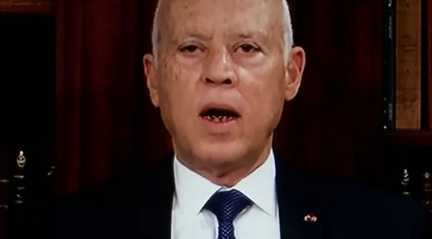
16 July 2022; MEMO: Rached Ghannouchi, head of the Ennahda Movement, asserted on Friday that Saied is taking advantage of the referendum on a new constitution to re-establish a dictatorship, warning that the scenario in Sri Lanka is not far from reaching Tunisia.
Ghannouchi, who was the speaker of the parliament until President Saied overthrew it, described the atmosphere prevalent in the period before the 25 July referendum as "undemocratic, static and funeral."
In an interview with Reuters, Ghannouchi said that the exacerbation of economic problems and the president's complete neglect of them, along with his focus only on political change, may drive Tunisia into a social explosion similar to that of Sri Lanka.
"The Sri Lankan scenario is not far from Tunisia," Ghannouchi predicted.
"Saied's speeches can only be converted into clashes, chaos, assassinations and crises. Tunisia may reach famine, and the country is in dire need of dialogue to confront these crises," Ghannouchi urged.
Ghannouchi, a former refugee, has been a major player in Tunisian politics since the 2011 revolution that toppled dictator Zine El Abidine Ben Ali, brought democracy and sparked the Arab Spring uprisings.
However, the extended economic failure in all successive governments since 2011 increased tension and frustration among Tunisians.
Ghannouchi said that the past decade was characterised by the failure to develop and address the problems of the economy, while Saied exacerbated the situation politically and economically.
He added: "25 July gave hope to Tunisians, but after a year of the coup, it turned out to be false hope and deception. It is a severe political crisis."
Ghannouchi has been a major critic of Saied since the president took over extensive powers last year.
"Tunisia is heading towards a dictatorial regime that gathers all powers in one person," Ghannouchi indicated.
Saied, however, said that his actions were necessary to save Tunisia from years of political infighting and that his constitution corrected the course of the 2011 revolution.
During the period that preceded the referendum, Saied significantly expanded his control over the judiciary and the formerly independent electoral authority, raising questions about the rule of law and fair voting.
The proposed constitution grants Saied nearly unlimited powers and weakens the role of Parliament and the judiciary. At the same time, the Ennahda Movement and most other parties urged Tunisians to boycott the referendum.




